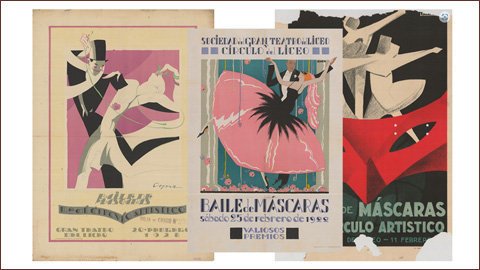The UAB recently launched a crowdfunding campaign to recover a selection of over 500 carnival masquerade ball scores from the 19th century, which were stored unpublished for decades at the Arxiu de la Societat del Gran Teatre del Liceu and were somehow miraculously spared from the 1994 fire.

The project, which will be conducted by UAB research groups, will allow recovering a sample of this rich cultural heritage and highlight the figure of leading Catalan composers whose works had disappeared from the opera house's repertoire.
Based on a selection of written scores, the project will carry out the digitalisation of each piece, while at the same time a musicological research project will be conducted to transcribe them, put them into parts, edit and then make them available for musicians interested in performing the pieces. To make it possible to perform the scores, versions will be made for emsembles of 20 to 25 musicians, since the pieces were originally created to be performed by the orchestra of the Gran Teatre del Liceu.
The objective of the campaign is to raise the 42,000 euros needed to conduct the project, which is expected to finalise in mid-2024. The project will consist in the editing, recording and interpreting of the pieces in public concerts - and, if necessary, in masquerade balls - to once again return to these pieces the social function they had when originally composed.
Carnival masquerade balls were in fashion and made people all over Catalonia dance from the mid-19th century to the start of the Spanish Civil War. The repetoire expanded from Barcelona—where masquerade balls were held at the Teatre Principal, Llotja or the Liceu—to all four corners of the country and were very diverse: foxtrot, xotes, mazurkas, waltzes and polkas. Thus, Catalonia was familiar with the melodies of the Strauss, Philippe Musard and Lamotte families, and also with Marià Obiols, Antoni Llubes and Josep Jurch. The latter was considered to be one of the most proligic Catalan musicians in these types of arrangements and compositions. With his orchestra, Jurch travelled throughout Catalonia and made it possible for several generations to dance to his music. He regularly participated in the carnival festivities held in Vilanova i la Geltrú, a city where he deposited part of his compositions, now conserved in the Víctor Balaguer Library-Museum.
The recovery of carnival dance scores of the Liceu forms part of a more ambitious project: the digitalisation of all documents found in the Societat del Gran Teatre del Liceu which is being carried out by the UAB since 2013. Thanks to the UAB Humanities Library, this digitalised resource can be openly consulted by researchers and the public in general.
The project includes the support of the UAB Faculty of Arts & Humanities and the Societat del Gran Teatre del Liceu.






